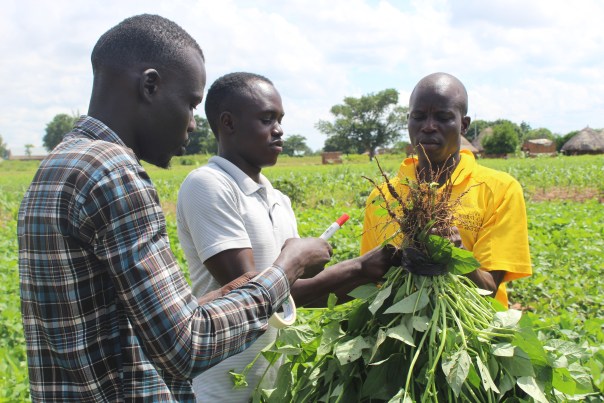
By Jimmy Siyasa
The Uganda Christian University has announced a change of the guard within its faculties and departments.
The announcement was made by the university’s Deputy Vice Chancellor for Academic Affairs, the Rev. Dr. John Kitayimbwa, during the farewell for some of the outgoing leaders and the unveiling of the new guard. The ceremony took place on May 10 in the Learning Commons Room, located at the Hamu Mukasa University Library.

“Covid-19 has shifted the demands,” UCU Vice Chancellor Associate Professor Aaron Mushengyezi said as he urged the new leaders to be creative in their work. “And so, as we come in to lead, please take note, you are not going to lead with the ordinary tools your predecessors have led with. You will require new tools because wholly duplicating what your predecessors did, may not work.”
Due to the “new normal” presented by the Covid-19 pandemic, Mushengyezi said all programs will have a digital equivalent.
“Covid-19 has changed the academic landscape,” he said. “And so, one of the main tasks for you is to pioneer and continue to consolidate e-learning.”
The university’s council chairperson, the Rt. Rev. Can. Prof. Alfred Olwa, congratulated the new leaders and thanked the outgoing for their dedication and hard work.
The newly appointed Head of the Department of Literature and Languages, Dr. James Tabu Busimba, was delighted by his new role at UCU. Busimba recently retired from a public university, Makerere, after clocking 60 years.
“I think serving in an institution that has one of its core values as Christ-centeredness is such a golden opportunity,” Busimba said. “I am grateful to God.”
According to the Rev. Dr. John Kitayimbwa, the Deputy Vice Chancellor for Academic Affairs, who unveiled the new team, the UCU Statute for Appointment of deans and heads of departments mandates that the appointments are ratified by the University Senate and then submitted to the institution’s human resource board for consideration.
Comments from some of the leaders
“To me, serving in Uganda Christian University is building the kingdom of God,” Professor Martin Lwanga, former Dean, School of Business, said. “It is a privilege, and some of us are still available to serve at this great institution.”
Eriah Nsubuga, the Head of the Fine Arts Department, said: “It is unusual times. But an opportunity for us to reengineer how we do things. And one thing I like about UCU is that they care for their staff.”
“This year, we are changing direction as a university,” said Prof. Kukunda Elizabeth Bacwayo, the dean of the School of Research and Post Graduate Studies. “We shall provide a bigger amount of funding to professors, to lead various teams of researchers.”
The changes that were announced in May 2021
| Faculty/ Department | New Head of Department | Predecessor |
| School of Research and Post-Graduate Studies | Dr. Emilly Comfort Maractho (Now the Director- UCU Africa Policy Center) Also Head of the Department of Journalism and Media Studies, until contract expires on 31 May 2021 |
Reverend Professor Lawrence Adams |
| Faculty of Social Sciences |
Mr. Kasule Kibirige Solomon |
|
|
Department of Social Work and Social Administration.
(Expired contract ) |
Contract renewed | |
| Faculty of Education and Arts | ||
| Department of Languages and Literature | Dr. James Taabu Busimba | Mr. Peter Mugume |
| Honors College | Ms. Pamela Tumwebaze | Reverend Abel Kibedi |
| Department of Art and Design | Dr. Eriah Nsubuga | Dr. Joel Masagazi |
| Department of Education | Dr. Mary Kagoire | |
| School of Business | ||
| Department of Management and Entrepreneurship | Mr. Martin Kabanda | Mrs. Elsie Mirembe Nsiyona |
| Faculty of Health Sciences | ||
| Department of Public Health | Dr. Edward Mukooza | Dr. Ekiria Kikule |
ASSOCIATE DEAN APPOINTMENTS
| Faculty | New Dean | Predecessor |
| Faculty of Social Sciences | Rev. Dr. Andrew David Omona | Prof. Mary Ssonko Nabachwa |
| School of Business | Mr. Vincent Kisenyi | Assoc. Professor Martin Lwanga |
| School of Medicine | Dr. Gerald Tumusiime | Has been acting Dean, but now is the substantive Dean |
| Faculty of Engineering, Technology & Design | Assoc. Prof. Eng. Eleanor Wozei | |
| School of Law | Dr. Peter David Mutesasira | Dr. Roselyn Karugonjo Segawa |
| Faculty of Education and Arts | Rev. Can. Dr. Olivia Nassaka Banja | Effective date: September 1, 2021 |
CONTRACT RENEWALS
| Faculty | Dean/ Department Head | Renewal Date |
| Faculty of Journalism, Media and Communication | Professor Monica Chibita | To be communicated |
| Department of Communication | Dr. Angela Napakol | Effective date: June 1, 2021 |
| Bishop Tucker School of Theology | Rev. Can. Prof. Christopher Byaruhanga | Renewed in December 2020 |
| Faculty of Health Science | Dr. Miriam Gesa Mutabazi | Renewed but not communicated |
++++++++++++++++++++++++++++++++++++++++++++++++++++++++++++++++++++
To support Uganda Christian University programs, students, activities and services, go to www.ugandapartners.org and click on the “donate” button, or contact UCU Partners Executive Director, Mark Bartels, at m.t.bartels@ugandapartners.org.
Also, follow us on Twitter, Instagram and Facebook











You must be logged in to post a comment.